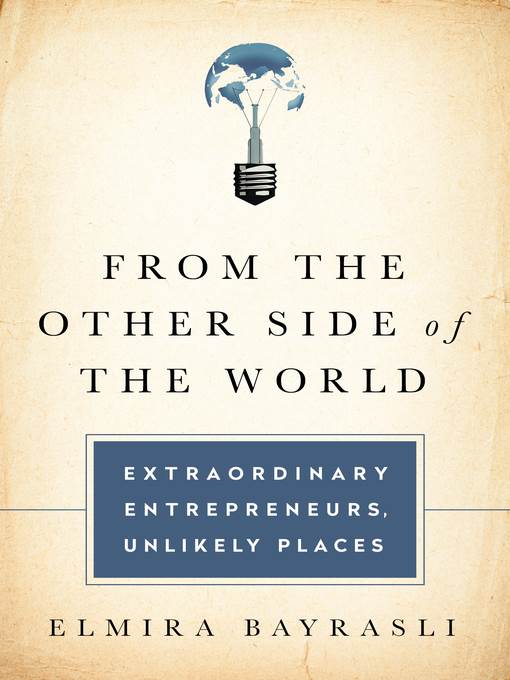
From the Other Side of the World
Extraordinary Entrepreneurs, Unlikely Places
کتاب های مرتبط
- اطلاعات
- نقد و بررسی
- دیدگاه کاربران
نقد و بررسی

June 29, 2015
In this absorbing debut, Bayrasli—cofounder of Foreign Policy Interrupted, which aims to amplify the voices of women working in foreign policy—profiles seven entrepreneurs from seven different countries who are breaking down barriers and overcoming obstacles. She identifies seven recurring obstacles to innovation in the developing world: scarce skilled labor and management, underdeveloped infrastructure, absent rule of law, a resistant status quo, monopolies, corruption, and lack of collaborative space. A full chapter is dedicated to each challenge and to how a specific entrepreneur is meeting it. To that end, Bayrasli introduces Bülent Celebi, CEO of AirTies, who launched a tech start-up in Turkey but struggles to find the talent necessary to grow his company; Tayo Oviosu, founder of the digital payment company Paga Tech in Lagos, Nigeria, who battles his country’s inadequate infrastructure; Shaffi Mather, founder of Dial 1298, an ambulance service in India, who must overcome corrupt bureaucracy; and Russia’s Yana Yakovleva, founder of a successful chemical company who is unjustly jailed and must fight against her country’s endemic corruption. Bayrasli does an admirable job of showcasing these pioneers and arguing that, despite their challenges, the next big breakthrough will come from them or someone like them, not from Silicon Valley. Agent: Gillian MacKenzie, Gillian MacKenzie Agency.

June 15, 2015
A foreign policy/business expert examines how entrepreneurs in developing countries are revolutionizing "business, investment, economics, politics, and society." Bayrasli, who was born and partly raised in Turkey before immigrating to the United States, grew up with a privileged perspective on two different worlds. Her home country was a place "where little seemed to work," while her adopted one was a place where creativity and risk-taking could reap financial rewards and benefit global society. The author uses her uniquely bifurcated vision to explore how entrepreneurs in non-Western countries are overcoming obstacles generally unknown to Western entrepreneurs and to show how the next Steve Jobs will likely not be an American. She looks at the accomplishments of seven extraordinary individuals in seven developing countries in Asia, Africa, Eastern Europe, and Latin America who are involved in such diverse fields as technology, finance, health care, chemical manufacturing, and energy. Alike in their drive, courage, and inventiveness, these men and women have worked against such barriers as poor infrastructure, lack of capital, government fraud, and a weak rule of law by "building culture, leveraging networks, creating collaborative spaces [and] collaborating with the competition." Some, like Pakistani network designer Monis Rahman, are using the Internet to create websites and search engines where "the anchor is ideas, not ideology, and the participants are innovators, not insurgents." Others, like Russian chemical engineering executive Yana Yakovleva, have begun modeling entrepreneurial behaviors that encourage businesses to act as a check on a government struggling with corruption. Still others, like Chinese mobile phone mogul Lei Jun, are attempting to encourage a country mired in a tradition of authoritarianism and top-down political control to begin to embrace change and innovation. Throughout this eye-opening and informative book, Bayrasli offers fascinating insight into how hardship and marginalization may prove to be even greater "mothers of invention" in the 21st century than First World social and economic privilege. A sharp, thought-provoking study.
COPYRIGHT(2015) Kirkus Reviews, ALL RIGHTS RESERVED.

Starred review from July 1, 2015
Entrepreneurs worldwide, including individuals in relatively remote and poor areas, have used the Internet and social media to launch successful businesses and to help their respective countries progress. Some of these companies, such as Alibaba, have become powerful players in global marketplaces. Bayrasli (cofounder, Foreign Policy Interrupted) tells of seven innovators from across the globe in countries such as Mexico, Nigeria, Pakistan, Russia, and Turkey, and examines how they handled the risks associated with doing business in these nations. Dangers include lack of capital, infrastructure, and business networks. Corruption and red tape are also significant factors. Despite the challenges, many of these entrepreneurs used the collaborative and community-building features of social media to construct and expand their customer bases and scale their corporations. VERDICT Potential entrepreneurs will find the stories inspirational and will be encouraged to follow their dreams regardless of the circumstances.--Caroline Geck, Camden Street Sch. Lib., Newark, NJ
Copyright 2015 Library Journal, LLC Used with permission.

August 1, 2015
Bayrasli's tightly written, engrossing book jumps right to the important point: entrepreneurship isn't limited to what Silicon Valley can create and spread. It is, however, slowed in developing countries by what Bayrasli identifies as seven obstacles, including lack of skilled labor and collaborative space, corruption, and more. Such obstacles can obscure the goal, but here Bayrasli details the innovations of seven non-U.S. entrepreneurs determined to realize their respective visions, in their own countries, ultimately not just bringing in much-needed jobs and revenue but also redefining entrepreneurship globally. For instance, Istanbul's Bulent Celebi is working on wireless technology; in Mumbai, activist Shaffi Mather is creating a for-profit ambulance service; and in Beijing, the so-called Steve Jobs of China, Lei Jun, is creating smartphones and apps in a country traditionally resistant to change. It's not easy or fast. As Bayrasli notes, identifying and turning a gap into a viable business will take patience, research, and time. This fact-filled, hopeful book will be a boon to future-business-minded readers and a wake-up call to those thinking the U.S. holds the reins of creating new growth.(Reprinted with permission of Booklist, copyright 2015, American Library Association.)

























دیدگاه کاربران